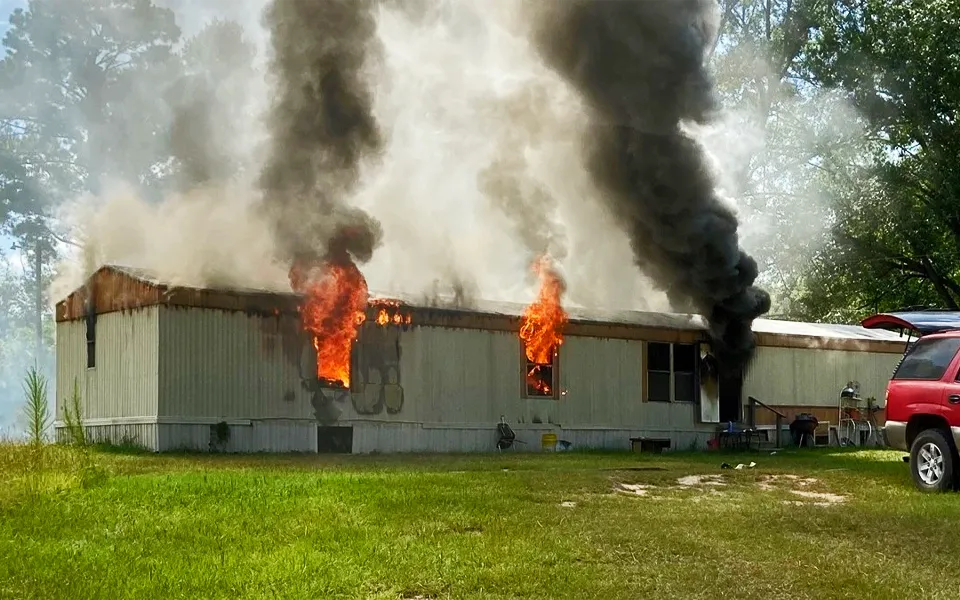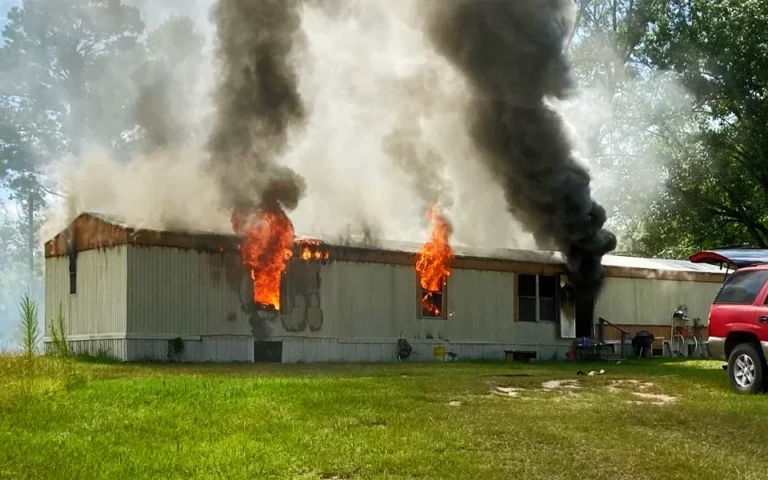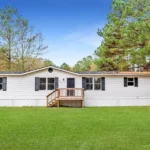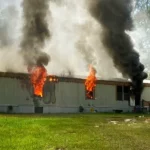
Mobile homes, also known as manufactured homes, are a popular housing option for many North Carolina residents. However, mobile homes can be more susceptible to fires than traditional homes due to their construction and materials. In this article, we will discuss several fire prevention tips for North Carolina residents who live in mobile homes.
Importance of Fire Safety in Mobile Homes
Fire safety in mobile homes is important because they can be more susceptible to fires due to their construction and materials. A fire in a mobile home can spread quickly, putting residents at risk. Additionally, mobile homes are often located in communities or parks where many units are in close proximity to each other, thus increasing the potential for fires to spread and cause greater damage. Taking steps to prevent fires in mobile homes can save lives and protect property. It is also important to comply with fire safety regulations set by the government and the park management.
Tips for Fire Prevention in Mobile Homes
Keep flammable materials away from heat sources: This includes items such as curtains, paper, and cleaning supplies. Keep these items at least three feet away from heat sources like stoves and heaters.
Install smoke alarms
When it comes to smoke alarms for mobile homes, it’s important to use alarms that are specifically designed for use in mobile homes.
There are several types of smoke alarms available, including:
- Ionization smoke alarms: These alarms are typically less expensive than other types, but they may not be as effective in detecting slow-burning fires, such as those caused by smoldering materials.
- Photoelectric smoke alarms: These alarms are more expensive than ionization alarms, but they are generally more effective in detecting smoldering fires.
- Dual-sensor smoke alarms: These alarms combine ionization and photoelectric sensors, providing the best of both worlds. They can detect both fast-burning and smoldering fires.
- Wireless smoke alarms: These alarms connect to other alarms in the home, allowing them to all sound at once in the event of a fire. This is particularly useful in mobile homes where the alarm may be placed in one area of the home, but the fire can occur in another area.
Make sure that smoke alarms are installed on every level of your mobile home, including in bedrooms. Test the alarms regularly to ensure they are working properly.
Have a fire extinguisher on hand
Keep a fire extinguisher in an easily accessible location in case of an emergency. Make sure everyone in your household knows how to use it. When it comes to fire extinguishers for mobile homes, there are several types available, each designed for different types of fires.
The most common types of fire extinguishers include:
- ABC fire extinguishers: These extinguishers are suitable for use on all types of fires, including those caused by wood, paper, liquids, and electrical equipment. They are a good choice for mobile homes as they can be used on a variety of fire types.
- BC fire extinguishers: These extinguishers are suitable for use on fires caused by flammable liquids and gasses, as well as electrical equipment. They are not suitable for use on fires caused by wood or paper.
- CO2 fire extinguishers: These extinguishers are suitable for use on fires caused by electrical equipment. They are not recommended for use on fires caused by wood, paper, liquids, or gasses.
- Water fire extinguishers: These extinguishers are suitable for use on fires caused by wood and paper. They are not recommended for use on fires caused by liquids, gasses, or electrical equipment.
It is important to note that when choosing a fire extinguisher for your mobile home, you should select one that is appropriate for the types of fires most likely to occur in your home. It is also good practice to have multiple types of fire extinguisher, as each one is designed for specific types of fire and in case of emergency, you have multiple options to extinguish the fire.
Regularly clean your stove and oven
Grease and food particles can build up on your stove and oven, which can be a fire hazard. Clean them regularly to reduce the risk of a fire. Cleaning a stove or oven is an important task in keeping your mobile home safe from fires. Food particles and grease can build up on these appliances over time, creating a fire hazard.
Here are some tips on how to clean your stove or oven:
- First, remove any loose food particles or debris from the stove or oven. This can be done by using a damp cloth or sponge to wipe down the interior of the appliance.
- Next, use a stove or oven cleaner to clean the interior of the appliance. These cleaners are specially formulated to remove tough stains and grime. Simply spray the cleaner on the interior of the stove or oven, and then wipe it down with a damp cloth or sponge.
- For tough stains, you can use a paste made of baking soda and water. Apply the paste to the stains, let it sit for a few minutes, and then wipe it away with a damp cloth or sponge.
- For the stove top, you can use a stove top cleaner to remove any spills or stains. Make sure to follow the manufacturer’s instructions when using the cleaner.
- Clean the oven racks and grates by removing them and scrubbing them with warm soapy water or using the self-cleaning feature if your oven has one.
- Finally, wipe down the exterior of the stove or oven with a damp cloth or sponge to remove any remaining cleaner or debris.
Keep heating and cooling systems maintained
Have your heating and cooling systems inspected and serviced regularly to ensure they are operating safely and efficiently. Maintaining a heating and cooling system in a mobile home is important to ensure that it is operating safely and efficiently. Here are some steps you can take to maintain your heating and cooling system:
- Schedule regular maintenance: Having your heating and cooling system inspected and serviced by a professional on a regular basis can help identify and fix any potential issues before they become major problems.
- Change air filters regularly: Air filters play a crucial role in maintaining the efficiency and effectiveness of your heating and cooling system. They should be checked and changed regularly, typically every 1-3 months, depending on usage and the type of filter you have.
- Keep vents and ducts clean: Dust and debris can accumulate in vents and ducts, reducing airflow and making your system work harder. Cleaning or vacuuming them regularly can help improve air flow and reduce the risk of fire.
- Keep the area around the heating and cooling equipment clear: Keeping the area around the equipment free of debris and clutter can help ensure proper air flow and reduce the risk of fire.
- Monitor energy consumption: Keeping an eye on your energy consumption can help you identify when something is not right with your system, and can help you identify when it’s time to call in a professional.
By following these steps, you can ensure that your heating and cooling system is running efficiently and safely, which can save you money on energy bills and reduce the risk of fire in your mobile home.
Have a fire escape plan:
Develop a fire escape plan with your household and practice it regularly. Make sure everyone knows two ways out of every room in case of a fire. A fire escape plan is an essential aspect of fire safety for mobile homes. The best fire escape plan for a mobile home should include the following elements:
- Designate two exits from every room: In case one exit is blocked by fire or smoke, having a secondary exit can be life-saving. Make sure all windows and doors can be easily opened and are not blocked.
- Have a meeting place outside: Designate a specific location outside of the home where everyone should meet after evacuating. This will help ensure that everyone is accounted for and that emergency responders know who is still inside the home.
- Practice the plan: It is important to practice the plan with all members of the household, including children, so that everyone knows what to do in case of a fire.
- Have an emergency contact: Have an emergency contact outside the mobile home park or community, so that you can call them if you are unable to reach emergency services.
- Keep a fire extinguisher and a phone near the exits: In case of a small fire, a fire extinguisher can be used to put it out before it spreads, having a phone nearby allows you to call 911 or other emergency services.
- Have an emergency kit ready: Prepare an emergency kit that includes essentials such as water, food, first aid kit, and important documents, so that you can take them with you in case of evacuation.
It is also important to note that in case of fire, it is important to stay low to the ground and crawl to avoid the smoke and heat. The best way to survive a fire is to prevent it from happening, but by having a well-rehearsed escape plan, you and your family will be more prepared to act quickly and safely in the event of a fire.
Benefits of a Fire Safe Mobile Home
- Increased safety for residents: Taking steps to prevent fires in mobile homes can save lives and protect property.
- Peace of mind: Knowing that your mobile home is safe from fires can give you peace of mind and allow you to enjoy your home without worrying about potential hazards.
- Protection of property: A fire in a mobile home can cause significant damage to the structure and personal possessions. By preventing fires, you can protect your property and avoid costly repairs.
- Compliance with fire safety regulations: Many mobile home parks have fire safety regulations that residents must comply with. By taking steps to make your mobile home fire safe, you can ensure that you are in compliance with these regulations.
In conclusion, mobile homes can be more susceptible to fires than traditional homes, but there are several steps that residents can take to prevent fires. By following these tips, North Carolina residents can increase safety, protect property, and enjoy peace of mind in their mobile homes.




